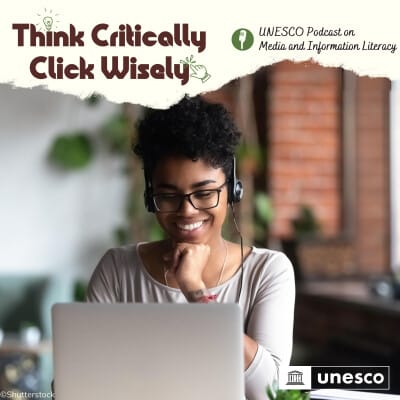In an effort to enhance people’s abilities to access, utilize and share reliable information in both physical and digital spaces, UNESCO has launched a podcast series “Think Critically, Click Wisely” on media and information literacy.
The Podcast series consists of eight episodes and is accessible on popular streaming platforms like Spotify and Amazon Music. It aims to equip listeners with essential media and information literacy skills through engaging discussions with media experts and compelling stories from around the globe.
The audience can expect to gain practical insights into navigating various topics such as disinformation, hate speech, digital skills, AI and privacy.
Through the podcast series, listeners will:
-
Understand the significance of Media and Information Literacy in today’s digital age.
-
Acquire essential skills for navigating the digital landscape.
-
Identify and counter misinformation and disinformation, including conspiracy theories, through fact-checking and related techniques.
-
Recognize hate speech and discrimination across various multimedia platforms and advocate for more diversity, equity, and inclusion.
-
Gain insights into the functionality of Artificial Intelligence and algorithms, as well as the ethical use and training of AI tools.
-
Understand both individual and institutional responsibilities in safeguarding privacy, as well as the available avenues for recourse in the event of privacy breaches.
The podcast series is a condensed version of UNESCO’s Massive Open Online Course (MOOC) Think Critically, Click wisely: Media and Information Literacy in the next normal. Consisting of 20 modules, the MOOC provides comprehensive and interactive training to equip learners with the media and information literacy skills. Learners can explore a boarder range of topics such as digital authorship, entrepreneurship, health, and well-being.
Available in English and Spanish, both the MOOC and podcast series are suitable educators, students and concerned citizens alike.
Additional links:

